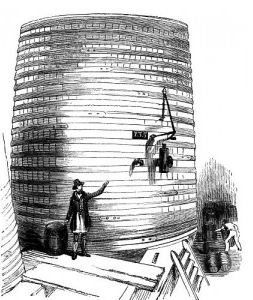
Images via Yofavo
After getting a tan yesterday I awake to find the world capped under tupperware. And the rain comes down. London in spring I suppose: some Sunday ruminations...
A few months ago Geoff Manaugh (BLDG BLOG) tweeted about a 1919 disaster, the "Boston Molassacre". A large molasses storage tank burst, and a wave of treacle roared through the streets (apparently at over 50km/h) killing 21 and injuring 150. Wiki notes: "The event has entered local folklore, and residents claim that on hot summer days, the area still smells of molasses."
This put me on to the London Beer Flood of 1814. The whole strange tale begins with a party organised by Meux's Brewery (owned by the first Baronet Sir Meux, whose name is inexplicably pronounced 'myooks'), located on the junction between Oxford Street and Tottenham Court Road. The occasion was a grand dinner to celebrate the construction of a giant vat capable of holding 600,000 litres of the popular beer stout porter (now known simply as stout). It was allegedly two storeys high and had a diameter of 20 yards. 200 hundred people dined within it.
Subsequently it was filled to capacity and the full pressure of the porter put upon its 29 iron hoops. Shortly after a workman noticed a small crack in one of the hoops, but seeing as they each weighed more than 200kg, he thought nothing of it. At around 6pm the same day the vat burst, creating an explosion reportedly heard five miles away. The immense pressure from the first vat toppled the second, the weight of which fell through to the floor below. A chain reaction ensued, 1.4 million litres of beer tore through the building's facade.
At that time Tottenham Court Road was the boundary of the St. Giles Rookery, and the building was surrounded by low housing of a poor construction. Several of the buildings could not stand the force of the wall of porter and collapsed. Eight people are recorded to have died, drowning in basements, crushed by debris or subsequent alcohol poisoning.
 Rescue efforts were greatly slowed by the drunken masses scooping the beer directly from the cobbles. An apocryphal story has it that as beer-soaked victims were rushed to hospital the smell of beer led patients on other wards to believe beer was being served for all patients except them. Not accepting this apparent injustice they started a riot, which increased the number of wounded.
Rescue efforts were greatly slowed by the drunken masses scooping the beer directly from the cobbles. An apocryphal story has it that as beer-soaked victims were rushed to hospital the smell of beer led patients on other wards to believe beer was being served for all patients except them. Not accepting this apparent injustice they started a riot, which increased the number of wounded.After an investigation the courts ruled that the event had been an act of God, and that no one was responsible. The beer company continued on that site until the 20's when it was demolished and the Dominion Theatre constructed in its place. I would frankly quite like to see a tsunami of beer crush the home of the Queen Musical.

No comments:
Post a Comment